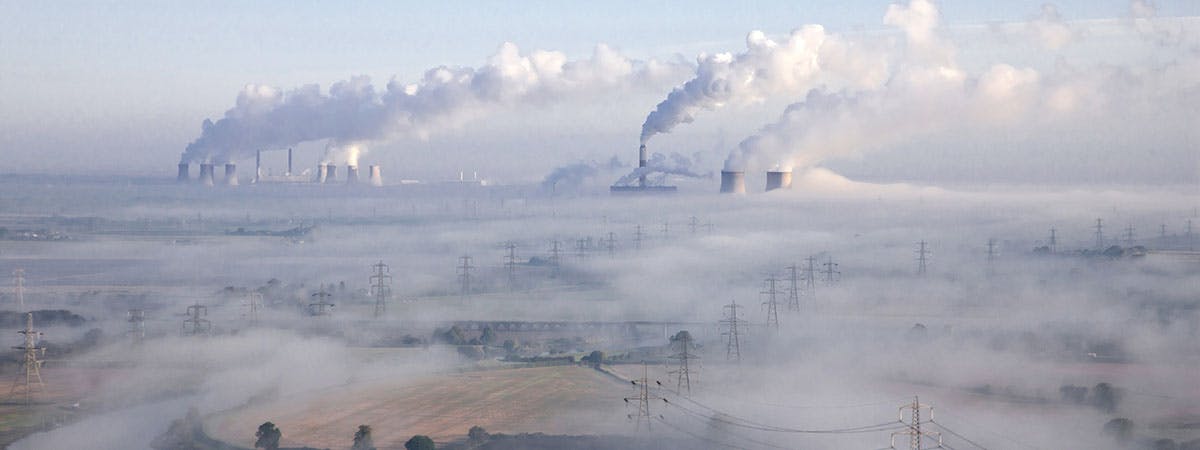By Charlotte Morris, Final Year Criminology student
From the outset of Donald Trump’s presidential campaign, his focus was on dividing societies and the exclusion of certain groups of people from the United States (Gambino, 2018).

Yet, despite being one of the greatest, if not the most significant threat that our planet faces, his imprudent environmental policy will “slow progress on reducing air pollution and greenhouse gases that warm the planet” (Holden, 2018: np). Some of the current White House Officials in the administration do not believe the significant risk that the scientifically proven phenomenon of climate change and the devastating affects it has on ecosystems and the weather around the globe poses. This is evidenced by the United States’ Administrator of the Environmental Protection Agency who is famously quoted as saying climate change is “not the greatest crisis” that we face (Holden, 2019: np). Despite this, the issue of climate change has been in news headlines and pushed into the spotlight for the last three decades (Revkin, 2018).
Nevertheless, the impact that climate change has on exacerbating conflict around the world goes largely ignored by governments. According to Davidson (2018), despite reports on the effect climate change has on conflicts, governments are still failing to address the problem. Whilst there is limited research into whether the effects of climate change are increasing conflict over the long term (Nordås and Gleditsch, 2007; Barnett and Adger, 2007), there are large amounts of research into high temperatures and increased interpersonal violence. This is supported by Anderson (2001) who asserts that climate change can also increase violence. Thus, not only can you attribute temperature rises to a potential increase in violent behaviour, but also reduced rainfall preventing access to capital to maintain livelihoods can be argued to increase poverty, also increasing the possibility of conflict (Theisen et al, 2013).
Galtung (1969) explains structural violence as something avoidable which is built into institutions and shows up as unequal power and consequently as limiting individual agency. Moreover, climate change can be associated with differential victimisation in which the poor and vulnerable suffer from the violence linked with climate change more than the rich and powerful (White, 2011). The effects that environmental degradation has on populations is disproportionately aimed at those from lower socioeconomic backgrounds, despite the fact that it is those in power that are causing or choosing not to stop further devastation (Holden, 2018). Furthermore, failure to act now in order to prevent global warming, in other words, climate change denial has itself been described as criminal (Brown, 2010; Tucker, 2012).
The disregard for the current and future harm caused by rescinding pro-environmental policies by the Trump administration can therefore be viewed as a form of violence. Although, as there is no one identifiable actor this structural violence is a consequence of legislation all across the world. Executive orders made by the Trump administration in order to secure jobs in the coal industry have also increased the use of damaging fossil fuels (Merica, 2017).
Media narratives in today’s society are focussed on the subjective violence (Žižek, 2008) such as knife crime and terror attacks and fail to recognise arguably the most violent acts such as contributing to climate change which affects every single living organism on the planet. This is supported by Jewkes (2015) who asserts that there are news values that are required for a story to reach a threshold of perceived importance, for example simplification, risk or involving high-status persons; climate change policy and the effects that it has on international conflict does not reach this threshold in mainstream media. Whilst governments around the world are creating legislation to reduce single use plastics, use sustainable energy sources and reduce emissions, Donald trump has taken a step back by reversing policies designed to do these very things.
Trump’s ‘Make America Great Again’ slogan can be seen as a form of cultural violence; the innate superiority of Western states is a form of cultural violence due to ideology (Galtung, 1990). Not only is it based on reducing illegal immigration, but it is also focussed on furthering the economy of the United States, including reducing regulation on coal mining. As mentioned previously, those that are most at risk from global warming are the least powerful, especially in other countries around the world. The process of creating an ‘other’ through political aims is not only a form of cultural violence but is leading to both structural and subjective violence also.
This cultural violence permits other forms of violence by making them seem less serious and normalised (Galtung, 1990). Empirical research conducted by Hsiang et al (2013) shows that when there are significant variations in the climate, this can have substantial effects on the frequency of conflict across a diverse range of contexts. Not only does this show that it is already occurring, but as climate change worsens over the next century, conflict may also increase, causing the death of significantly more innocent people. This is supported by The CAN Corporation (2007: 6) who infer that “climate change can act as a threat multiplier for instability in some of the most volatile regions of the world”.
An example of a conflict in which environmental factors are contributory is the Darfur genocide in Sudan. Goodhart (2016) further supports this by arguing that increased drought and desertification created competition for resources and land through which violence arose between the two groups. The genocide killed more 100,000 civilians and uprooted many more in conflict between the majority Arab and minority Christian groups (Berlatsky and Chalk, 2015). Furthermore, Gerhardt (2009: 488) asserts that the U.S. approach to the Darfur crisis is a “geopolitical calculation aimed at maintaining the U.S. claim on the valuation of global life without, however, committing many resources to actually protecting and securing this life within a meaningful political community”. This can be linked to current policies which further lead to environmental degradation with no concern on the consequences it has on both the climate and international conflict.
Punishing a nation state for their environmental policies or labelling them as criminal is problematic. However, the concept of zemiology allows the social harm that is caused to be analysed and discuss what threats are posed to our person or property (Burke, 2018). Hillyard et al (2004) outlines three types of harm caused by states, one of which is contested harms in which the state is accused of causing harm but denies either the existence of the harm or their own responsibility. The environmental policy of President Donald Trump can be argued to be a contested harm, due to the paradoxical denial that climate change is either real or a problem which is being intensified. The forms of violence that climate change represents are exacerbating conflict, destroying diversity in our ecosystems and causing natural disasters which are devastating to human life.
The idea that cultural and structural violence can lead to the subjective requires further exploration in order to fully understand the consequences of global warming not only to the environment but also to people and intergroup conflict. Whilst his policies are not directly the sole cause for environmental degradation, the way in which Donald Trump is being callous with the planet and the finite number of resources that we possess is intrinsically violent.
The neo-liberal ideology of the U.S. administration is in direct opposition to environmental concerns and is also generating serious environmental consequences (McCarthy and Prudham, 2004). These policies are a form of structural violence that in turn leads to the subjective; this subjective presents a clear form of violence through which the true nature and cause of climate change is then forgotten. Trumps paradoxical insistence upon Making America Great Again should perhaps be questioned as to what expense said greatness would cost the rest of the planet.
Reference List
- Anderson, C. (2001) Heat and Violence. Current Directions in Psychological Science, 10(1), pp. 33-8.
- Barnett, J. and Adger, N. (2007) Climate Change, Human Security and Violent Conflict. Political Geography, 26(6), pp. 639-55.
- Berlatsky, N. and Chalk, F. (2015) Darfur. Michigan: Greenhaven Press.
- Brown, D. (2010) Is climate science disinformation a crime against humanity? The Guardian, 3 November.
- Burke, R. (2018) An Introduction to Criminological Theory. 5th edn. London: Routledge.
- The CNA Corporation (2007) National Security and the Threat of Climate Change. Virginia: CNA Corporation. Available at: https://www.cna.org/cna_files/pdf/national%20security%20and%20the%20threat%20of%20climate%20change.pdf [Accessed 27 March 2019].
- Davidson, H. (2018) Climate change is exacerbating world conflicts, says Red Cross president. The Guardian, 21 October. Available at: https://www.theguardian.com/world/2018/oct/21/climate-change-is-exacerbating-world-conflicts-says-red-cross-president [Accessed 26 April 2019].
- Galtung, J. (1969) Violence, Peace, and Peace Research. Journal of Peace Research, 6(3), pp. 167-91.
- Galtung, J. (1990) Cultural Violence. Journal of Peace Research, 27(3), pp. 291-305.
- Gambino, L. (2018) 'Assault on our country': Trump sows racial division as midterms approach. The Guardian, 23 October. Available at: https://www.theguardian.com/us-news/2018/oct/23/donald-trump-midterms-immigration-fear-racial-division [Accessed 26 April 2019].
- Goodhart, M. (2016) Human Rights: Politics and Practice. 3rd edn. Oxford: Oxford University Press.
- Hillyard, P., Pantazis, C., Tombs, S. and Gordon, D. (2004) Beyond Criminology: Taking Harm Seriously. London: Pluto Press.
- Holden, E. (2018) Trump races against clock to roll back major Obama-era environment rules. The Guardian, 3 October. Available at: https://www.theguardian.com/environment/2018/oct/03/trump-administration-roll-back-major-obama-era-environment-policies [Accessed 27 March 2019].
- Holden, E. (2019) Andrew Wheeler: Trump's EPA pick says climate change 'not the greatest crisis'. The Guardian, 16 January. Available at: https://www.theguardian.com/environment/2019/jan/16/andrew-wheeler-climate-change-trump-epa-hearings [Accessed 27 March 2019].
- Hsiang, S., Burke, M. and Miguel, E. (2013) Quantifying the Influence of Climate on Human Conflict. Science, 341(6151), pp. 1-14.
- Jewkes, Y. (2015) Media & Crime. 3rd edn. Los Angeles: SAGE.
- McCarthy, J. and Prudham, S. (2004) Neoliberal Nature and the Nature of Neoliberalism. Geoforum, 35, pp. 275-83.
- McKibben, B. (2016) The mercury doesn’t lie: We’ve hit a troubling climate change milestone. Boston Globe, 5 March. Available at: https://www.bostonglobe.com/opinion/2016/03/04/why-degree-temperature-jump-more-important-than-trump-hands/lCyz5MHZkH8aD0HIDJrcYJ/story.html [Accessed 28 March 2019].
- Merica, D. (2017) Trump Dramatically Changes US Approach to Climate Change. CNN Politics, March 2017. Available at: www.cnn.com/2017/03/27/politics/trump-climate-change-executive-order/index.html [Accessed 26 April 2019].
- Nordås, R. and Gleditsch, N. (2007) Climate Change and Conflict. Political Geography, 26(6), pp. 627-38.
- Revkin, A. (2018) Climate Change First Became News 30 Years Ago. Why Haven’t We Fixed It?. National Geographic, July 2018. Available at: https://www.nationalgeographic.com/magazine/2018/07/embark-essay-climate-change-pollution-revkin/ [Accessed 26 April 2019].
- Theisen, O., Gleditsch, N. and Buhaug, H. (2013) Is Climate Change a Driver of Armed Conflict? Climate Change, 117, pp. 613-25.
- Tucker, W. (2010) Deceitful tongues: is climate change denial a crime? Ecology Law Quarterly, 39, pp. 31–94.
- White, R. (2011) Transnational environmental crime: toward an eco-global criminology. London: Routledge.
- Žižek, S. (2008) Violence: Six Sideways Reflections. London: Profile Books Ltd.




